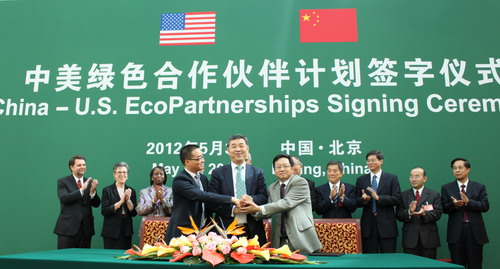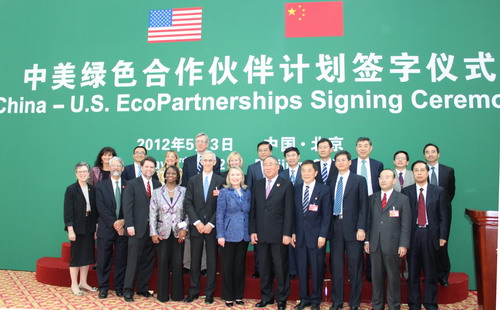Peking University, May 8, 2012: The Institute of Clean Energy (ICE), Peking University recently signed an agreement with UCLA and the China National Climate Change Strategy Research and International Cooperation Center to join the China-U.S. EcoPartnerships Program.

The EcoPartnerships Framework aims at developing new models of mutually beneficial voluntary arrangements between a range of state, local, and private sector organizations to spur innovation, investment, and engagement on clean energy and environmental issues, including climate change. The Framework was signed by the United States and China in December 2008, under the U.S.-China Ten-Year Framework for Cooperation on Energy and Environment (EcoPartnerships Framework) in Beijing.
Professor Zhang Dongxiao, director of ICE and executive vice dean of the College of Engineering, signed the agreement with Li Junfeng, director of the China National Climate Change Strategy Research and International Cooperation Center, and professor He Lei, director of the Research Center for Clean Energy at UCLA at the U.S.
The signing ceremony was held during the fourth China- U.S. Strategic and Economic Dialogue in Beijing, on May 3. Secretary of State Hillary Rodham Clinton welcomed the partnership in her speech. China's National Development and Reform Commission Vice Chairman Xie Zhenhua co-chaired the event.
At the ceremony, five new China-U.S. EcoPartnerships, including PKU-UCLA, were signed. The PKU-UCLA EcoPartnership will enlist a consortium of clean energy and climate change leaders from American and Chinese universities, think tanks, and the private sector to conduct joint research on smart grids, intelligent vehicles, and electric vehicles.
UCLA and Peking University are spearheading the partnership, along with the China National Climate Change Strategy Research and International Cooperation Center.
The consortium is building a joint research laboratory on smart grid technology at Peking University that will serve as a hub for researchers and students, particularly from the U.S. and will enable them to better understand China’s energy development environment. It may also facilitate economic growth and clean job creation in the U.S. by introducing Chinese clean tech companies to the U.S.

Hillary Clinton (the 6th from the left in the front row) and Zhenhua Xie (the 5th from the right in the front row) at the ceremony
Edited by: Zhang Jiang
Source: College of Engineering